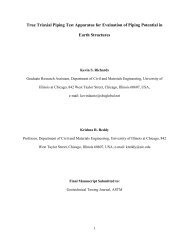Toward a Useful Theory of Mentoring: A Conceptual Analysis and ...
Toward a Useful Theory of Mentoring: A Conceptual Analysis and ...
Toward a Useful Theory of Mentoring: A Conceptual Analysis and ...
Create successful ePaper yourself
Turn your PDF publications into a flip-book with our unique Google optimized e-Paper software.
Table 3<br />
Comparing Three Processes for Transmitting Work-Related Knowledge<br />
Formal Training Socialization <strong>Mentoring</strong><br />
Number <strong>of</strong><br />
Participants<br />
Relationship<br />
Bases<br />
Recognition<br />
Needs<br />
Fulfillment<br />
Knowledge<br />
Utility<br />
Infinite<br />
Authority-mediated<br />
Recognition <strong>and</strong> selfawareness<br />
unavoidable<br />
Multiple but must<br />
include organization<br />
or authority-derived<br />
objectives<br />
Includes knowledge<br />
presumed relevant to<br />
attaining organization<br />
mission or goals or<br />
formal job<br />
requirements<br />
Dependent upon group<br />
size<br />
Informal, typically<br />
entailing unequal<br />
knowledge or<br />
experience<br />
Does not require<br />
recognition<br />
Multiple but must<br />
include group needs<br />
May or may not serve<br />
sanctioned work<br />
objectives, knowledge<br />
develops or reinforces<br />
group norms<br />
Dyads (including sets<br />
<strong>of</strong> dyads)<br />
Informal, requiring<br />
unequal knowledge<br />
Requires recognition<br />
(by both parties) for<br />
role enactment<br />
Multiple but must<br />
serve the needs <strong>of</strong> the<br />
two voluntary<br />
participants<br />
Must be workrelevant,<br />
but from the<br />
self-interested<br />
perspective <strong>of</strong> the<br />
involved parties<br />
32



